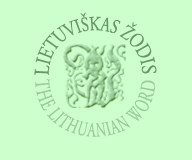- AUSRA (orig. Auszra, The Dawn), monthly of the Lithuanian
national movement, published in Ragaine and Tilze (Tilsit), Lithuania
Minor (East Prussia) between 1883-1886; it circulated in
Russian-occupied Lithuania Major. As early as 1880-1881 Lithuanian
students in Moscow were producing a hand-written and mimeographed
paper by that name. When the Russian government denied them permission
to publish a Lithuanian journal in Vilnius, Jonas Sliupas, a student
at the University of Moscow, devised another plan. He wrote to Jurgis
Miksas, a young Lithuanian patriot living in Lithuania Minor, then
part of the German state, and suggested that they organize a special
committee to publish Ausra. When Miksas raised various
objections, the task of organizing the project was undertaken by Jonas
Basanavicius, a physician who had been contributing articles to the
Lithuanian press in Lithuania Minor from Bulgaria since 1880. Living
in Prague in 1882, he began to correspond with Jonas Andrius Vistelis
in Poznan (Posen). The Polish writer J. I. Kraszewski had already
suggested to the latter that a Lithuanian periodical was absolutely
necessary "if the Lithuanian nation does not want to die."
Vistelis and Miksas decided that Basanavicius would be the most
competent editor, and that the technical aspects of the publication
would be handled by Miksas. Basanavicius agreed to the arrangement on
the condition that any material contributed to the publication be
subject to his approval. Martynas Sernius contributed 150 marks;
Vistelis, 100 marks; and Basanavicius, 100 francs; and the first issue
was published. It was dated March, 1883 but it only appeared in early
April. From Ragaine it was sent in sealed envelopes to addresses
collected by M. Davainis Silvestravicius, or smuggled across the
German-Russian border into Lithuania Major.
- The enthusiastic reaction of the readers to Ausra made
Basanavicius so optimistic that he wrote to the Russian Minister of
the Interior Tolstoi, requesting that the prohibition against the
Lithuanian press be repealed and that permission be granted to publish
the paper in Kaunas or Vilnius. Hoping for a favorable decision,
Basanavicius refrained from criticizing the Russians for their
oppressive anti-Lithuanian measures. His restraint caused some
discontent among his readers. Matters were further complicated when
Miksas resigned for personal reasons. Jonas Sliupas, now an emigre
living in Geneva, was invited to join the editorial staff in 1883. He
arrived in Tilze and promised not to print any article without
Basanavicius' approval, but the promise was not kept. The polemical
and political nature of his articles and his commentary on other
contributors' articles proved to be offensive to those taking a
strictly legalistic view of the Tsarist regime, to persons of a
pro-Polish orientation, and to the Catholic clergy. Having joined the
national movement in Lithuania Minor, he was soon wanted by the German
police and was forced to leave East Prussia and Ausra in 1884.
After this Miksas and Martynas Jankus rejoined the Ausra staff
in Tilze. Of limited literiary capabilities, they refrained from
polemical writing, and thereby calmed those whose anger had been
aroused. In the fall of 1885, when Miksas acquired a printing shop, he
became sole editor of Ausra. As the printing establishment
expanded, however, he had less time to devote to Ausra and
invited the teacher Jonas Andziulaitis from Lithuania Major to join
the editorial staff. But Andziulaitis was no able to put any new life
into the paper, moreover, Miksas ran into debt. Basanavicius' health
was failing, and thus Ausra was discontinued. 29 numbers of the
periodical were published, totaling 40 issues (some of the issues were
published two or three at a time). The journal's circulation was 1000,
and it numbered a total of 74 contributors, most of whom wrote under
assumed names.
- Because of the frequent changes in the editorial staff, Ausra
was not able to maintain a consistent editorial line. But its general
tendencies are reflected in Basanavicius' introductory remarks in the
first issue. He lists the following points as Ausra's raison
d'etre: the elevation of national ideals; the development of a
national pride based on Lithuania's history; the instillment of love
for the Lithuanian language and cultivation of its use; the attainment
of national unity and peace with Lithuania's neighbors; and the
presentation of pertinent cultural matters. A number of these goals
were later adopted by other Lithuanian publications, who also added
new elements to the list and sometimes stressed one aspect more than
the others. For this reason the period beginning with Ausra's
publication and ending with the repeal of the prohibition of the
Lithuanian press in 1904 is called Ausros gadyne (The Dawn
Period). All the enlightened Lithuanians of the time, particularly the
major and minor writers, are called ausrininkai ("The
Dawnists").
- The ausrininkai included the editors and close collaborators
of Ausra as well as all the paper's contributors. These were:
Jonas Basanavicius, Jonas Andrius Vistelis, Jurgis Miksas, Martynas
Jankus, Jonas Sliupas, Jonas Andziulaitis, Mecislovas Davainis
Silvestravicius, Juozas Miliauskas, Silvestras Gimzauskas, Stanislovas
Dagilis, Petras Arminas, Ksaveras Sakalauskas, Aleksandras
Fromas-Guzutis, Antanas Krisciukaitis, Adomas Jakstas - Dambrauskas,
Tomas Zickus, Jonas Maciulis-Maironis, Vincas Kudirka, Petras
Vileisis, and a number of less significant persons, some of whom never
wrote for Ausra but simply supported its goals. Ausra
was very influential in the further development of the Lithuanian
national movement. It strengthened Lithuanian national aspirations for
cultural freedom and political independence.

